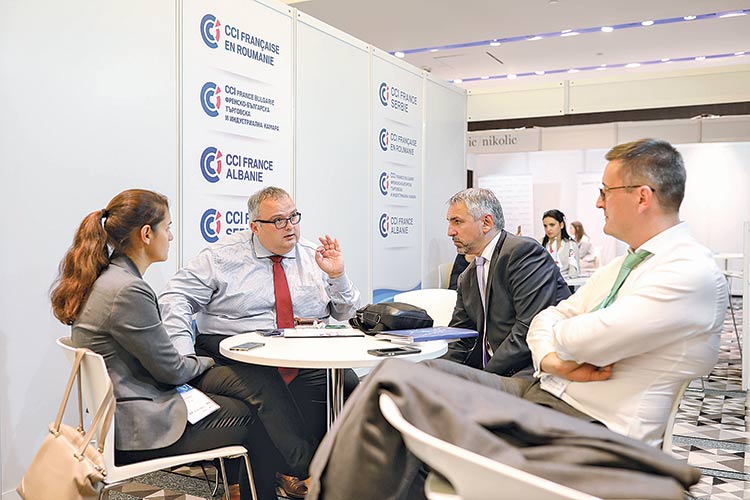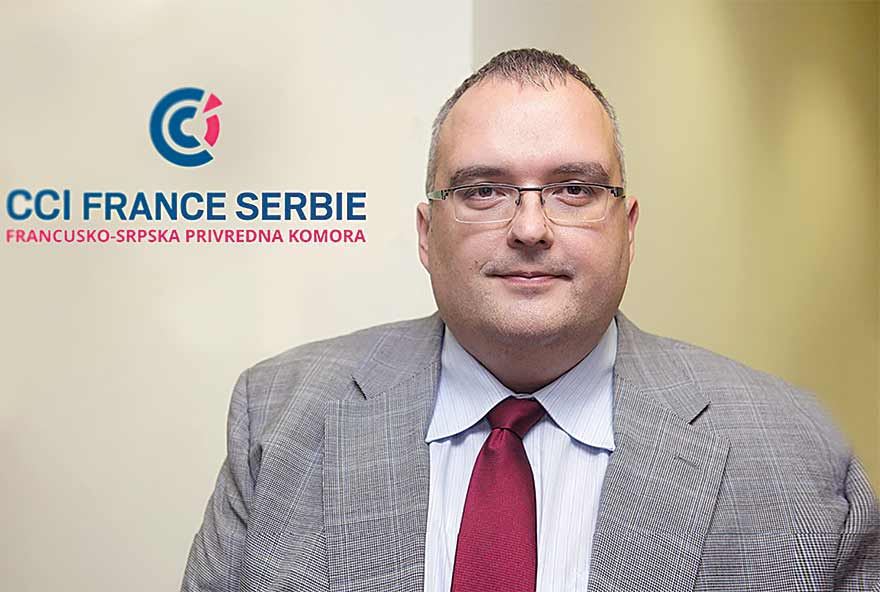The Western Balkans are becoming an ever more important region on the French agenda. Visits of top French officials, as well as agreements signed and commitment shown to the local community among French companies operating here, all testify to the claim that Serbia is among France’s priorities on the international stage. Also supporting this notion are indications that we could again host French President Emmanuel Macron by the end of this year.
If Serbia really does host French President Macron again this year, that will provide strong confirmation of the ever-increasing interest of French companies in Serbia. Despite the difficult moments experienced by French companies in Serbia during the COVID-19 pandemic, it seems that there’s ever more good news when it comes to cooperation between the two countries. Here CCIFS President Dragoljub Damljanović shares with us his experiences of the Chamber’s work during the pandemic, as well as his expectations regarding the further development of economic cooperation.
You’ve stated repeatedly that the most important thing to do while we’re in this crisis is to protect our people. To what extent have your members managed to retain their personnel, maintain business processes and ensure the liquidity of their companies during the previous period?
Members were confronted by a very difficult situation, because business activity was reduced to a minimum in many sectors and it was difficult to maintain business at all and to not lay off employees. Fortunately, the growth of business activities was noticeable in most sectors in the second half of the year, and the economy began to recover gradually. On the other hand, some companies will need more time to make up for losses, because they weren’t even able to relaunch activities in the second half of the year. It has been shown so far that companies with localised production have better chances than those with globalised supply chains, but the vast majority of businesses still have significant changes in liquidity, and business models themselves will continue to be changed to a greater or lesser extent, while very few companies will be in a zone of no change.
However, as we emphasise constantly at the Chamber, the most important thing is for the business community to try to assist small and medium-sized enterprises, for large systems to go out of their way to meet their payment deadlines, and for banks to offer more flexible terms and cashflow assistance. This crisis will pass, it is important to show that we are human, that we take care of each other, that we preserve jobs and people, SMEs, and that we remain calm and clear headed.
French investors have come to stay, as we see in the fact that they implement their own CSR culture, new HR methodologies, as well as new technologies, thereby also improving local communities and the companies with which they cooperate
How much did the chamber manage to help them in that during the previous period?
I’m particularly satisfied with the speed of our reaction in the crisis situation – already on the first day of the declared state of emergency, following consultations with members from the ranks of small and medium-sized enterprises, we wrote to Finance Minister Siniša Mali with a request for measures to assist SMEs. Our action to seek assistance from the finance minister was quickly joined by twelve other bilateral associations in Serbia, as they recognised the importance of the initiative. It was at that moment that we launched the slogan “How can we help you?”, thus transforming ourselves into a tool to help the membership, providing them with information and connecting those who are seeking something with those who have something to offer them. The Chamber is there to help members with information related to COVID-19, processes on how to access state aid, assistance in re-establishing the normal functioning of supply chains, while there were also, of course, sanitary and travel inquiries.
We had an opportunity to hear recently that the primary focus of French companies is actually North Africa, and not the Western Balkans. How accurate is that?
The entire African continent is a sphere of interest for France. It has strong historical ties to these countries, many of which are Francophone countries, and it is completely logical for France to be more present on the African continent than it is in some other countries. I would also give the example of the French Development Agency, which is most active on the African continent. However, the Western Balkans is becoming an increasingly important region on the French agenda. For example, the French Development Agency opened its regional headquarters in Belgrade in 2019, and that office is responsible for the entire Western Balkans and for financing a large number of projects in the region.

Linked to this topic, you released the publication “French Economic Presence in Serbia” this year. What does it tell us about the presence of French companies in our lands?
That publication tells us that their presence is increasing every year. I would like the numbers to grow faster, nevertheless what’s important is that all investments of French companies are extremely stable. French investors have obviously come to stay, and confirming that additionally is the fact that when they embed themselves in Serbia, French companies implement their own CSR culture, new HR methodologies, as well as new technologies, thereby also improving local communities and the companies with which they cooperate. I believe that, in this sense, the Serbian economy is becoming more competitive at the world level, which is very positive.
Your virtual events with other French chambers in the region gave us the opportunity to discover that interest in the Serbian automotive industry and agriculture exists. What can Serbia offer French investors in this area?
The automotive industry is a sector that we promote specifically. Serbia has exceptional development potential in this domain. The greatest growth of recent years has been recorded in this industry, and all sub-industries linked to this sector. A large number of various manufacturers that have launched operations in Serbia are suppliers in the chain of the automotive industry. For example, this is a sector that foreign investments came to even during the worst periods of the COVID-19 crisis, such as Japanese company Toyo Tires late last year, which invested in Serbia in the midst of the pandemic, setting up its first European factory in our country.
We also promote Serbia as a general destination for nearshoring, because capacities and competencies for high-quality industrial production exist here in all domains. The pandemic has shown us the fragility of supply chains and the need for production to be as close to markets as possible.
When it comes to agribusiness, this is an historically strong and valued sector in Serbia, as a country that has fantastic potential, especially for organic production. What is lacking is a greater presence of the processing industry, which is why we encourage French companies to locate their production facilities on the spot, in order to strengthen Serbia in the processing segment.
Serbia needs a lot of investment in the area of renewable resources and ecology… and French companies have great expertise in this domain and are interested in this area
Major changes to Serbia’s energy and ecology sectors have been announced. Do you see a place for yourselves and major French companies in this transition of Serbian energy and the Serbian economy towards green solutions?
A serious and detailed incentive programme to support economic growth has been prepared in the European Union, and this programme is mostly focused on ecology, the green economy and digitalisation. The Government of the Republic of Serbia should devise a plan to attract as much of that money as possible, in order to launch these parts of its economy. Moreover, as a candidate country that’s on the road to EU integration, Serbia has accepted obligations regarding renewable resources and ecology and, given that we’re still a long way from achieving the goals, it’s clear that a lot of investments are needed from this perspective. French companies have great expertise in this domain and it is logical for them to be interested in this area.
In this context, what are the most important steps that the CCIFS expects the Serbian government to take in order to realise these major plans?
We would regard it as being positive if the Government of the Republic of Serbia encouraged polluters to reduce their emissions and demonstrated the importance of respecting norms. We are glad that Serbia has started providing subsidies for the purchase of electric and hybrid vehicles. And, of course, it is essential to continue investing in the production of electricity from renewable energy sources.

In the meantime, despite the pandemic, there have been political meetings that are important from both the French and Serbian sides. What is the next step awaiting us on this front?
One of the most important political meetings of last year was the November visit of French Minister of Foreign Trade and Economic Attractiveness Franck Riester. That visit saw the signing of an Agreement between the two governments on cooperation in the area of implementing priority projects in Serbia. With this agreement, which is worth €581 million, France confirmed its interest and confirmed that Serbia is among its priorities on the international scene. There is also talk about us once again hosting French President Emmanuel Macron by the end of this year.
The start of works on a metro rail system have also been announced in Belgrade this year, and the metro project has always been a “French topic”. How are your feelings as we await this event?
The Belgrade metro will be one of the largest investments in Serbia. We are very honoured that French company Alstom was selected as a partner in its construction project. It was in November last year that an agreement was signed between the Government of Serbia and the Government of France on the provision of funding for the metro amounting to 454 million euros. The metro is planned to open in 2028, and I’m already looking forward to the day when we will ride in French trains.
| PROMOTION We promote Serbia as a general destination for nearshoring, because capacities and competencies for high-quality industrial production exist here in all domains. | SATISFACTION I’m particularly satisfied with the speed of our reaction in the crisis situation, because from the first day of the declared state of emergency we transformed ourselves into a tool to help our members. | INITIATIVE The Serbian Government should devise a plan to attract as much European money as possible to launch the parts of its economy focused on ecology, the green economy and digitalisation. |
|---|